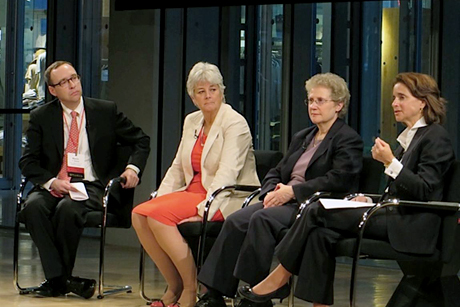Panelists detail progress, challenges of economic recovery
By Claire Lambrecht

Although a full economic recovery remains elusive, leading economists said they recognized recent improvements during a Cornell panel discussion on the state of the economy, financial stability and Wall Street reform held at the New York Times Center in Manhattan May 16.
“The good news is it’s better. It could get better still,” Maureen O’Hara, the Robert W. Purcell Professor of Finance and professor of economics, told the crowd of 135 alumni and friends. Gross domestic product growth, employment gains and a reduction in the deficit offer evidence of this trend, she explained.
Recent improvements in the economy mark a dramatic reversal from just a few years ago. “It’s almost unbelievable to think about how bad things were,” said Abby Joseph Cohen ’73, a partner and senior investment strategist at Goldman Sachs. “Even the safest of the financial products, things like money market funds, came under enormous pressure. People did not trust their banks,” she said.
Repairing confidence in the financial system required a strong collective response, said Mary John Miller ’77, undersecretary for domestic finance at the U.S. Department of the Treasury. That response arrived in the form of the 850-page Dodd-Frank Wall Street Reform and Consumer Protection Act, a law intent on making financial institutions more resilient, increasing market transparency, providing a playbook for bank failure and protecting consumers.
For the financial sector, Dodd-Frank mandated stress tests, and subsequent recapitalization of banks served as a turning point, Cohen said. “I do believe that the United States government does deserve a lot of credit for stepping into the brink when something needed to get done,” she said.
While some criticize Dodd-Frank and the U.S. government for overreach, Miller said that the best thing to do was to continue to pursue the work of reform. “There’s no one who appreciates more what’s left to be done,” she said. “I’d say that we’re closer to the finish line than the beginning. I think it’s important to get this done so that we can live in a world where people have a lot of confidence in the financial system.”
Fortunately, signs of repair abound. Consumers have significantly deleveraged their balance sheets. For large American companies, the situation is even better. “When you look at the large companies in the United States, the S&P 500, the balance sheets are about the strongest we’ve ever seen them,” Cohen said.
In spite of these gains, real challenges like average wage growth and youth unemployment persist, O’Hara said. “The inequality is not going to get better, given the current situation,” she said.
Regarding inequality, the defining variable isn’t geography or industry, but education, Cohen said. “We’ve gone out to companies and said, ‘Why aren’t you hiring?’ One of the answers we got here in the United States is that the people who are available don’t fit the jobs that we have. The skills required have gone higher and the quality of the workers has not risen to match it,” she said.
“The State of the Economy, Financial Stability and Wall Street Reform” was moderated by Kevin Hallock, the Donald C. Opatrny ’74 Chair of the Department of Economics and the Joseph R. Rich ’80 Professor, and was hosted by Cornell’s Department of Economics and Cornell trustee Donald Opatrny ’74.
Claire Lambrecht ’06 is a freelance writer based in New York.
Media Contact
Get Cornell news delivered right to your inbox.
Subscribe